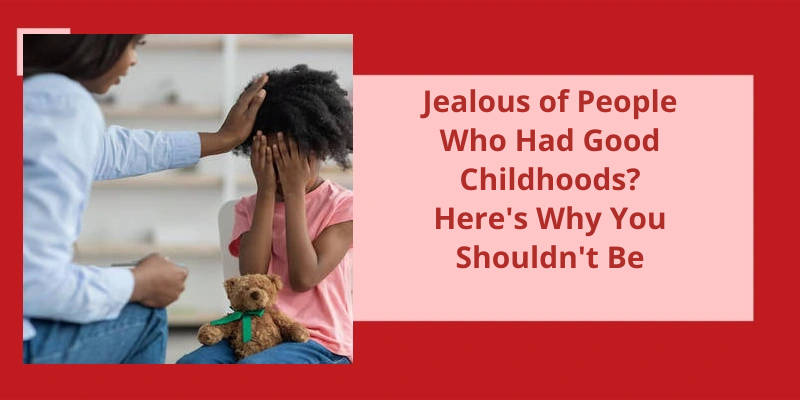Childhood is a pivotal stage in everyone's lives, shaping our experiences, beliefs, and ultimately, our adult selves. It’s natural to feel envy towards those who’d seemingly idyllic childhoods, filled with love, stability, and cherished memories. Instead of fixating on what we lacked during our earlier years, it’s essential to recognize that our unique journey has equipped us with valuable lessons and strengths that can surpass those who were seemingly privileged. This essay aims to explore why we should refrain from being envious of those who’d good childhoods, highlighting the transformative power of our life experiences and the potential for personal growth that lies within each of us.
Is Jealousy Related to Childhood Trauma?
Jealousy is often perceived as a normal human emotion, but it’s origins can be deeply rooted in childhood experiences. This is because childhood trauma can create a sense of insecurity that manifests in various ways, including envy.
When someone has had a good childhood, their sense of self-worth and security tends to be solid. They’ve likely been surrounded by loving and supportive relationships, which have helped shape their positive self-image. As a result, they’re less likely to feel threatened by the successes or affection received by others.
In contrast, individuals with a history of childhood trauma often carry deep-seated insecurities. They may have experienced emotional neglect, abandonment, or even abuse in their early years, all of which can significantly impact their self-esteem. Consequently, these individuals may struggle with feelings of unworthiness and constantly compare themselves to others, leading to jealousy.
By cultivating self-esteem and practicing self-compassion, individuals can learn to redirect their focus inward, rather than constantly comparing themselves to others.
Ultimately, it’s crucial to remember that everyones journey is unique. While it may be tempting to be envious of those who’d good childhood experiences, it’s important to focus on personal growth and healing. By prioritizing self-care and addressing childhood trauma, individuals can pave the way for a healthier and more fulfilling future.
Types of Childhood Trauma That Can Contribute to Jealousy, Such as Neglect, Abandonment, or Physical Abuse.
In childhood, experiences of neglect, abandonment, or physical abuse can have long-lasting effects on individuals. These types of trauma can lead to feelings of jealousy towards those who’d more nurturing and supportive childhoods. However, it’s important not to dwell on this jealousy, as it can hinder personal growth and happiness. Instead, focusing on healing and self-care can help individuals break free from the negative impact of childhood trauma and cultivate a positive future.
Understanding the underlying causes of excessive jealousy is essential in order to address and alleviate it’s negative effects. While there’s no singular root cause, several factors contribute to this complex emotion. Insecurity, past experiences, and fear of loss commonly lay the foundation for feelings of jealousy. These factors, when triggered, can strain relationships and impede personal growth. By delving into the depths of jealousy’s origins, one can begin to unravel it’s complexities and work towards healthier emotional well-being.
What Causes Excessive Jealousy?
Jealousy is a complex emotion that can stem from various underlying factors. When we lack self-confidence or feel inferior, we may become easily threatened by the achievements or possessions of others. If someone has endured betrayal, abandonment, or any form of trauma in relationships, they may develop a fear of being hurt again, which can manifest as jealousy.
Constant suspicion, accusations, and possessiveness can erode trust and intimacy. It’s crucial to address and communicate our insecurities or fears with our partners or loved ones, as healthy relationships are built on trust, mutual respect, and open dialogue.
The Role of Past Experiences in Shaping Jealousy.
Past experiences play a significant role in shaping jealousy. Jealousy is often rooted in personal insecurities and feelings of inadequacy. Individuals who’ve had negative or traumatic experiences in their childhood may develop jealousy as a defense mechanism to protect themselves from potential pain or rejection.
However, it’s important to remember that dwelling on feelings of jealousy won’t bring any benefits. Instead, focusing on personal growth, building self-confidence, and embracing positive experiences can help overcome jealousy. Comparison to others with seemingly better childhoods is counterproductive as everyone’s journey is unique, and dwelling on the past only hinders personal development. It’s essential to shift focus towards creating a fulfilling present and future, regardless of past experiences.
Source: What’s Jealousy and How to Manage It? – Centerstone
It’s time to address that green monster called jealousy and put an end to it’s toxic grip on your life. Jealousy has a way of robbing us of our joy and contentment, making us focus on what others have rather than appreciating our own blessings. These jealousy quotes serve as reminders that envy is a futile and destructive emotion that we should avoid at all costs. Let’s dive into these wise words and find inspiration to overcome envy and celebrate our own unique journey.
How Do I Stop Being Jealous of Others Success Quotes?
It’s natural to feel a twinge of jealousy when we see others achieving success or enjoying a good childhood. We often find ourselves comparing our own lives to theirs, counting their blessings instead of appreciating our own. However, it’s important to realize that jealousy is a useless and destructive emotion.
Overcoming jealousy requires a shift in perspective. Rather than seeing others success as a threat, we should view it as proof that our own dreams are possible. If they can achieve greatness, so can we. We should use their success as motivation to work harder, to keep pushing ourselves to reach our own goals.
Strategies for Managing Jealousy in a Healthy Way
- Practice self-awareness and introspection to understand the root causes of your jealousy.
- Communicate openly and honestly with your partner about your feelings and concerns.
- Build trust and reassurance by setting clear boundaries and expectations in your relationship.
- Focus on self-care and personal growth to boost your self-esteem and self-confidence.
- Avoid comparing yourself to others and instead focus on your own progress and achievements.
- Challenge and reframe negative thoughts and beliefs that fuel jealousy.
- Develop healthy coping mechanisms, such as deep breathing, mindfulness, or talking to a therapist.
- Engage in activities and hobbies that bring joy and fulfillment to your life outside of your relationship.
- Seek support from friends, family, or a support group to share your experiences and gain perspective.
- Consider professional help if your jealousy becomes overwhelming and starts negatively impacting your mental health and relationships.
Conclusion
In today's society, it's easy to find ourselves feeling envious of those who’d seemingly idyllic childhoods. Instead of being consumed by these emotions, we should shift our focus towards reflection and resilience. By acknowledging the challenges we faced, we can transform our experiences into sources of strength, wisdom, and empathy. It’s within our power to shape our lives and create our own version of a fulfilling adulthood, one that’s grounded in self-acceptance and personal growth. So, let’s embrace our unique journeys, celebrate the lessons learned, and forge ahead with confidence, knowing that our past doesn’t define our future.






